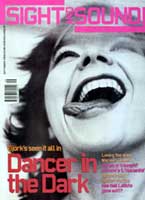Primary navigation

France/Australia 1999
Reviewed by Geoffrey Macnab
Our synopses give away the plot in full, including surprise twists.
Pamela Drury, a successful journalist in her thirties, is single and regrets turning down college sweetheart Robert Dickson's marriage proposal 13 years ago. Pamela is now attracted to crisis counsellor Ben but thinks he's already married and is put off asking him out.
After almost being run over, Pamela meets a woman who looks remarkably like her. This doppelganger turns out to have married Dickson and is living a seemingly idyllic life with three kids. Startled to meet her alternative self, Pamela is even more perplexed when her double vanishes, leaving her to look after the children.
Pamela soon realises that married life has its problems. Robert, an overworked businessman, is always too tired to have sex and the kids are a handful. When Pamela discovers Robert's been unfaithful, she has a fling with Ben, the crisis counsellor she met in her 'other' life, now a journalist. In a local restaurant, Robert proposes that he and Pamela renew their marriage vows. While she's in the bathroom, her double (who has been living her old life) turns up. They both return to their old lives. Single once more, Pamela meets Ben and, learning he is divorced, arranges to see him again.
Given its identity-swapping scenario, in which Pamela, a single journalist in her thirties, encounters her double and assumes her role as a suburban wife and mum, it's not surprising that Me Myself I seems schizophrenic. The pitch is superficially similar to that of Sliding Doors or La Double Vie de Véronique, but writer-director Pip Karmel (who edited Shine) is only interested in telling one side of the story. We're never shown how Pamela's double copes with the transition from housewife to city-based hack. Nor is the switch ever properly explained. Instead, her film follows Pamela as she adapts to family life.
In the early scenes, as she swigs vodka, goes on disastrous dates and bemoans her solitary lifestyle, Pamela comes across as a comic version of the singles-bar addict Diane Keaton played in Looking for Mr Goodbar (1977). At one point, she rails against the men who have let her down ("Bastard, coward, misogynist, commitment phobe, dental surgeon"), then later attempts suicide. But if she finds singledom miserable, she soon realises the family life she yearns for is equally oppressive.
In his documentary A Personal Journey with Martin Scorsese through American Movies, the director discussed how such 50s melodramas as All That Heaven Allows and Bigger Than Life showed the "psychotic undercurrents" of American family life - "the sugar and the poison," as Scorsese put it. In its most unsettling moments, My Myself I does something similar with the Australian suburbs. Pamela is a stranger, taken for granted by the family whose lives she has moved into. Her husband is patronising, chauvinistic and snores, one son is constantly rude to her and the teenage daughter is sarcastic and hostile. If this is what she has missed out on by pursuing her career so single-mindedly, she's had a lucky escape.
Karmel's screenplay is more tricksy than ingenious. She never explains how Pamela is able to pick up so quickly on her double's lifestyle and to strike up an instant rapport with three children she has never met before. The real 'Mr Right', crisis counsellor Ben, seems unattainable - until the final-reel contrivances throw him into Pamela's lap. The plotting may be feeble, but Karmel at least has a nice line in barbed one-liners and sight gags. There's an earthiness to the humour that you rarely find in Hollywood's romantic comedies. Bodily functions are always to the fore: the youngest of the children, for instance, is incapable of wiping his backside without Pamela's help.
With a less spiky star, all this might have seemed grossly self-indulgent, but Rachel Griffiths is too strong an actress to allow Pamela to turn into yet another fey Bridget Jones clone. This said, Me Myself I's determination to deliver a happy ending runs against the grain of much of the film. Karmel has spent so long detailing both the horrors of suburbia and the shortcomings of the single lifestyle that the upbeat finale rings hollow. Both Pamelas, one suspects, won't be happy for long.